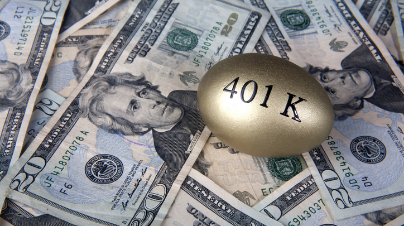 Q: How do I get my 401(k) retirement plan funds without penalty?
Q: How do I get my 401(k) retirement plan funds without penalty?
A: If you take a distribution from your retirement plan early, “meaning before the day you turn 59 ½ or age 55 if still in a 401(k),” you will generally have to pay a 10% early distribution penalty above and beyond any regular income taxes you may owe on the money.
Of course, it’s generally a bad idea to dip into your retirement plan early except in extraordinary circumstances. But when using your retirement funds is your only option, it’s good to know that there are several ways to avoid the extra 10% penalty on early distributions.
Important: Establish a series of SUBSTANTIALLY EQUAL PERIODIC PAYMENTS (SEPP).
 Q: What age can you withdraw from a 401(k) without penalty?
Q: What age can you withdraw from a 401(k) without penalty?
A: If you are under Age 55, and you still work for the company where your 401(k) retirement plan is, you will have only a few limited options to tap 401(k) funds, such as taking a 401(k) loan or a hardship withdrawal – If the company allows these options.
If you’re no longer employed by the company, you can roll the funds over to an IRA, or cash in the 401(k) plan. Be careful on cashing in – if you cash in you may void valuable creditor protection that stays in place when you keep the funds in the plan.
If you are retired, most 401(k) plans allow for penalty-free withdrawals at age 55 instead of having to wait until 59 1/2.
To use this 401(k) retirement age 55 provision your employment must have ended no earlier than the year in which you turn Age 55, and you must leave your funds in the 401(k) plan to access them penalty-free. (For many police, firefighters and EMTs, this provision makes funds accessible as early as Age 50, rather than 55.)
 Q: Are there any early 401(k) distribution options including 72(t)?
Q: Are there any early 401(k) distribution options including 72(t)?
A: If you separate from service in the calendar year in which you turn 55 or later, you may be able to take distributions from your 401(k) penalty free; however, income taxes will still apply. There are additional exemptions which may allow you to avoid the early withdrawal penalty, such as: permanent disability, medical expenses that exceed 7.5% of your adjusted gross income, death of the plan participant, payments under a QDRO, certain distributions to qualified military reservists called to active duty and 72(t) (also known as series of substantially equal periodic payments or SEPP).
If you would like help properly structuring your Early Retirement, please contact us today.
 Q: How can I take out my 401(k) money without penalty?
Q: How can I take out my 401(k) money without penalty?
A: There are certain exemptions that could keep you from paying the 10% early withdrawal penalty. These are called hardship exemptions and give you an option to access your funds – provided you meet the criteria. Hardship exemptions include:
- Death of the plan participant
- Became permanently disabled
- Paid out of pocket for medical expenses
- Forced to disburse funds by a court order
- You’re over the age of 55 and retired or left your job
- Substantially Equal Periodic Payments
Those are the hardship exemptions – and the IRS is very strict when it comes to giving them out. Basically, this isn’t for buying a new house (something that’s allowed under an IRA), or a new boat, or putting someone through college, or fixing up your home. This is an emergency measure and you have to demonstrate real need – not only to the federal government but also to your employer, who may have additional withdrawal guidelines you have to follow.
 Q: When can you take money out of a 401(k) without penalty?
Q: When can you take money out of a 401(k) without penalty?
A: The standard age for taking money out of your 401(k) plan is 59 ½. So, if you are over that age then you can take your money out as a dispersal and you’ll just pay ordinary income tax.
There are other situations where you can withdraw cash from your 401(k) plan before the age of 59 ½ without paying a penalty. Such situations include:
- Becoming permanently disabled
- You pass away and the account is paid to your beneficiary/estate
- Making an allowable medical expense deduction
- You’re separated from service (through permanent layoff, termination, quitting or taking early retirement) in the year you turned 55 or later
- Paying a levy on the 401k plan itself
In these instances the normal income tax rules apply, but you won’t pay the early withdrawal penalty. Keep in mind, you may want to consider what is known as a 72(t) Distribution Plan, which may be the solution.
 Q: What are the reasons to take money out of a 401(k) without penalty?
Q: What are the reasons to take money out of a 401(k) without penalty?
A: You may qualify to take a penalty-free withdrawal if you meet one of the following exceptions:
- You become totally disabled.
- You’re in debt for medical expenses that exceed 7.5% of your adjusted gross income.
- You are required by court order to give the money to your divorced spouse, a child, or a dependent.
- Separated from service (through permanent layoff, termination, quitting or taking early retirement) in the year you turn 55, or later.
- You’re separated from service and you have set-up a payment schedule to withdraw money in substantially equal amounts over the course of your life expectancy.
(Once you begin taking this kind of distribution you are required to continue for five years or until you reach Age 59 1/2, whichever is longer.) This is an area that we specialize in and can offer guidance and counsel.
 Q: At what age can you withdraw from a 401(k) without penalty?
Q: At what age can you withdraw from a 401(k) without penalty?
A: The Age 59½ distribution rule says any 401(k) participant may begin to withdraw money from his or her plan after reaching the age of 59½ without having to pay a 10 percent early withdrawal penalty. There is an exception to that rule, however, which allows an employee who retires, quits or is fired at Age 55 to withdraw without penalty from their 401(k). There are (3) key points early retirees need to know.
First, this exception applies if you leave your job at any time during the calendar year in which you turn 55, or later, according to IRS Publication 575.
Second, if you still have money in the plan of a former employer and assuming you weren’t at least Age 55 when you left that employer, you’ll have to wait until Age 59½ to start taking withdrawals without penalty. Better yet, you may want to get any old 401(k)’s rolled into your current 401(k) before you retire from your current job so that you will also have access to these funds penalty free.
Third, this exception only applies to funds withdrawn from a 401(k). IRAs operate until different rules, so if you retire and roll money into an IRA from your 401(k) before Age 59½, you will lose this exception on those dollars.

The Spivak Financial Group
If you would like help properly structuring your Early Retirement, please contact us today.




